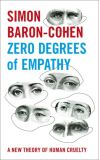
05 Jun 2012 12:47:10
Simon Baron-Cohen, professor of developmental psychopathology at Cambridge University, has a particular interest in the nature and functioning of empathy. He has written two previous books on the subject, Mindblindness and The Essential Difference (in which he put forward the intriguing theory that autism is an extreme form of the less emotionally literate "male" brain). In his new book, he attempts nothing less than "to understand human cruelty", along the way replacing "the unscientific term 'evil' with the term 'empathy erosion'". If this kind of rebranding sounds suspiciously like what Steven Poole would call "Unspeak", it's not because Baron-Cohen's intentions are anything less than honourable.
He talks us through a variety of conditions in which the ability to empathise is reduced or lacking (borderline personality disorder, narcissism, psychopathy), his premise being that violence of any sort can only occur in empathy's absence. This seems an important insight and is itself compassionate; it leads us to regard "evildoers" as not irredeemably bad but as somehow damaged.
Baron-Cohen also has interesting things to say about those on the autism spectrum whose closed-in, systemising minds can bear strange and sometimes wonderful fruit. Such people, he remarks, are possessed of "a mind constantly striving to step out of time, to set aside the temporal dimension in order to see… the eternal repeating patterns in nature".
A lack of empathy and hence thoughtless or cruel behaviour, he stresses, always stems from "people turning people into objects… in such a state we relate only to things, or to people as if they were just things" (his italics). Yet doesn't the technical and objectifying language of scientific materialism, its obsession with reducing emotions and states of awareness to the functioning of the brain's "frontal operculum" and "temporo-parietal junction", carry a risk of being just such a dehumanising approach? The fact that this isn't Baron-Cohen's error but a chronic blind spot in mainstream science itself makes the acknowledging of it all the more important.

